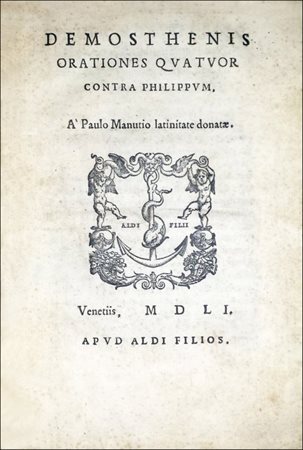 Bibliopathos - Via Enrico Toti 1, 37129 Verona
Bibliopathos - Via Enrico Toti 1, 37129 Verona
Medieval Notary Manuscripts & Law Books Sessione Unica - dal lotto 1 al lotto 280
Monday 28 December 2015 hours 17:00 (UTC +01:00)
DEMOSTHENES TRANSLATED BY THE YOUNG ALDUS’ SONDEMOSTHENES. Demosthenis...
DEMOSTHENES TRANSLATED BY THE YOUNG ALDUS’ SON
DEMOSTHENES. Demosthenis Orationes Quatuor contra Philippum, A Paulo Manutio latinitate donatae. Venetiis, Apud Aldi Filios, 1551 [Venice: Sons of Aldus, 1551].
4to, 18th century stiff vellum with blavk label and gilt lettered title at spine, ff. [52].
Aldine anchor of Aldus’ heirs at title-page. Dedicatory letter to Jean Morvilliers.
Scarce second edition of this elegant and esteemed translation made by Paolo Manuzio of the four Demosthenes’ «Philippics», the Orations against Philip of Macedon who was beginning his conquest of the Greece.
In September 1549, Francesco Greco wrote to Paolo Manuzio that, reading this translation, he seemed «to hear Demosthenes speaking Latin».
The first oration (351-350 BC) centered on the need for successful resistance for financial reform of the theorical fund to prepare for war and for swift action to avoid defeat. The second (344-343 BC) was a vehement attack against Philip and his Athenian supporters, delivered in the wake of the unsatisfactory Peace of Philocrates, which left Philip’s increasing power largely unchecked. Nonetheless it errs on the side of caution, perhaps indicative of Demosthenes’ own fear of the King, before whom he is said to have fainted. The third (341), the best of Demosthenes’ political orations, contrasts the ancient spirit of Athens with her present degeneracy. Having risen by his oratory to become the most influential politician in Athens, Demosthenes was able to weaken the pro-Macedonian factions, formulating alliances with other small states. He demands resolute action against Philip, a burst of energy from the Athenian people and the immediate dispatch of force. The fourth is the subject of controversy, with Demosthenes' authorship called into doubt, although the sentiment is similar to the third, the style is different.
It has been suggested that the text is descended not from his carefully honed speeches, but from notes for a spot oration, hence its unusual lack of finesse. Described by Cicero as «the perfect orator» and extolled as lex orandi by Quintilian, Demosthenes has long been regarded as one of the great minds of the Classical era, and his works remain a benchmark of eloquence and erudition.
References: CNCE 16744. Renouard, 146, 6: «les exemplaires sont rares, ainsi que ceux de la réimpression de 1551». Lettere volgari, vol. III (Francesco Greco write to Paulus Manutius): «Ho letto le quattro Filippiche di Demosthene, che V. S. ha voltato, anzi ho udito Demosthene parlante in latino, & in che lingua? in quella medesima certo che Cicerone, padre della Romana eloquenza, lo fece già rispondere ad Eschine, suo avversario [...]».BM STC Italian, 213. Dibdin, 486: «This translation is elegant and esteemed". Brunet II, 592: «Traduction estimée».









